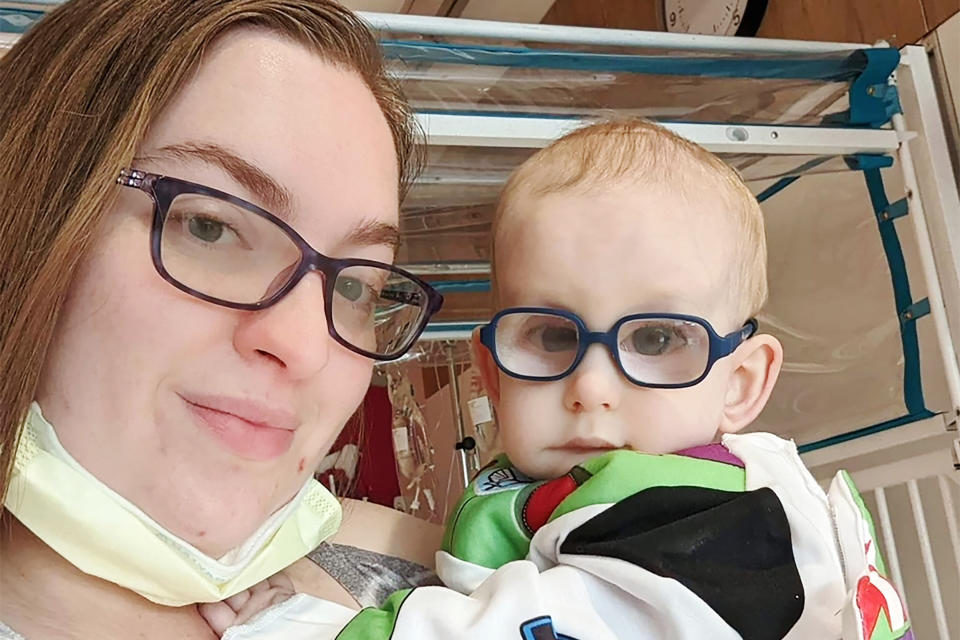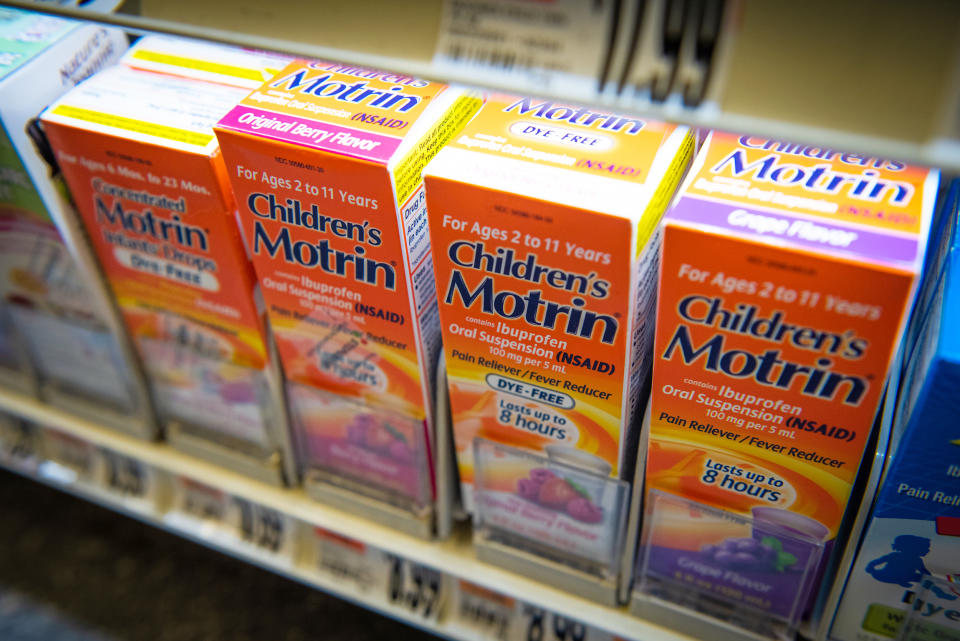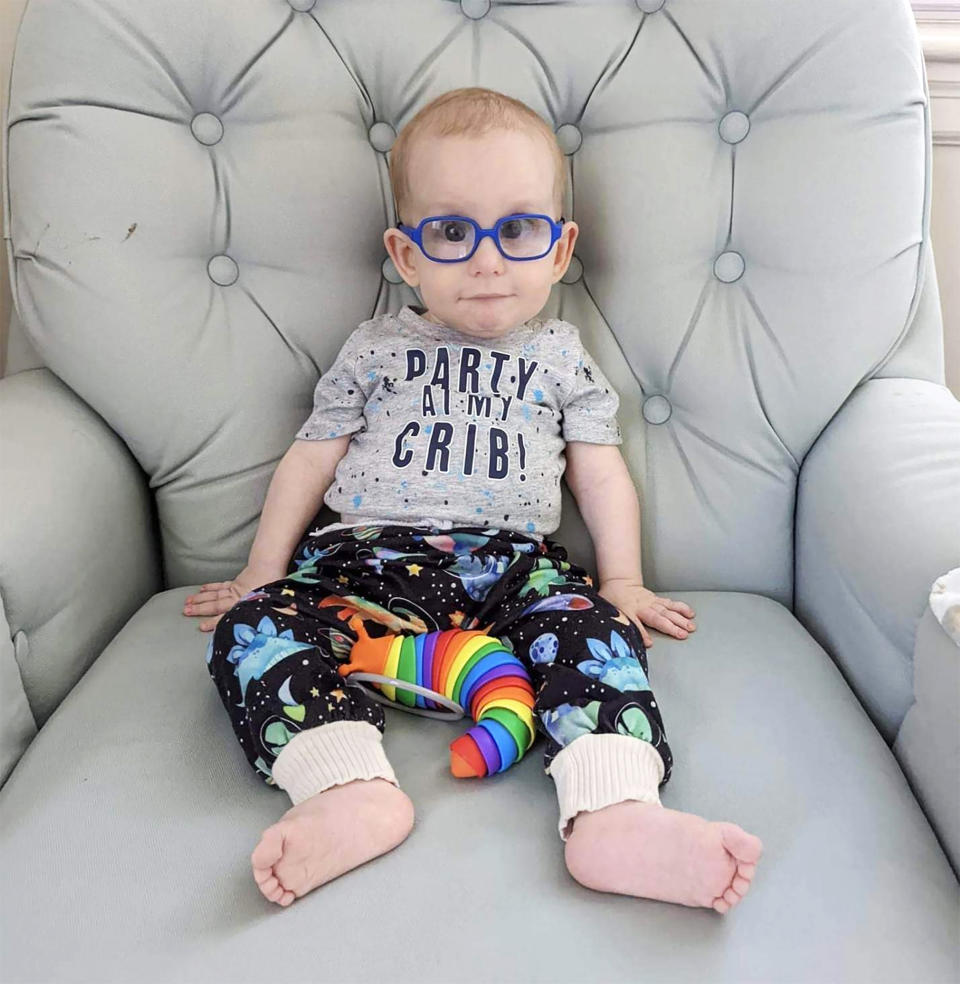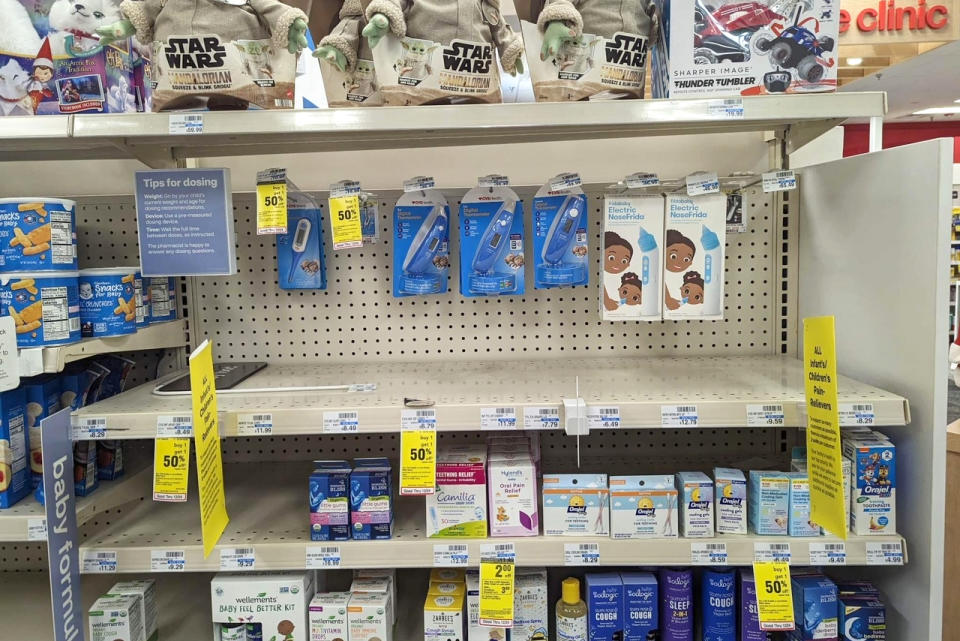Children’s medication shortages strain parents and pharmacies
- Oops!Something went wrong.Please try again later.
Pharmacists and parents across the country are contending with empty shelves as they search for children’s pain relief medications amid the spread of RSV, flu and Covid.
The surge of respiratory viruses has overwhelmed hospitals and doctor’s offices — 76% of pediatric hospital beds were full nationally as of Monday, according to data from the Department of Health and Human Services — and a number of pharmacies are reporting shortages of children’s Tylenol and ibuprofen. CVS and Walgreens announced Monday that they are limiting the number of children's pain relief medications customers can buy.
At CVS, both online and in-store purchases are capped at two medications per customer, while Walgreens limits online orders to six but does not have a cap in stores.
“It’s kind of a dry well,” said Brian Caswell, a pharmacist and the owner of the Wolkar Drug chain in Kansas and Missouri.

Caswell said shortages of children’s Tylenol and ibuprofen and their generic versions started a month or two ago. While some pharmacies were able to stock up, others, like his, are struggling to find any product at all, he said.
Worried parents have been coming in looking for bottles of medicine for weeks, Caswell said. For younger children who don’t have medicinal alternatives, he suggests options like a cold compress.
“Unfortunately, that’s about the only choices you have. There’s not too many out there,” he said.

So far, 30 children have died from the flu this season, according to data from the Centers for Disease Control and Prevention. Among the overall U.S. population, the agency estimates, there have already been more than 150,000 flu hospitalizations and 9,300 deaths since Oct. 1.
Hugh Chancy, the president of the National Community Pharmacists Association, which represents over 19,000 independent pharmacies, said member pharmacies are under tremendous pressure. Some, including one of his own five pharmacies in Georgia, also function as compounding facilities, where licensed pharmacists can create drugs to meet the needs of individual patients. Chancy said his staff members are talking to physicians about “writing prescriptions so that we can compound something over the counter,” like ibuprofen and acetaminophen liquids.
“We’ve never had to do that. This is something that has just always been available, and now it’s not,” Chancy said. “I’ve been practicing for 34 years, and this is the first time that I’ve ever had to worry about being able to recommend Tylenol, Advil or Motrin.”
Chantel Jablonski, a mother of an 18-month-old in Bryn Mawr, Pennsylvania, said the shortages have hit her family particularly hard. Her son has a rare genetic disease that has resulted in kidney disease, and his body can handle Tylenol but not ibuprofen, making it even harder to find the specific medication he needs.
“There’s nothing that the pharmacies can do for us, and there’s a whole lot of stuff that they’re out of, from the infant’s Tylenol to Pedialyte, all these basic things that my medically complex kiddo needs,” Jablonski said.
She has been relying on prescription versions of the medications from doctors, but now those supplies are also running out, she said. Since October, Jablonski said, her son has had RSV and Covid and been hospitalized for the flu.

“Instead of being able to go down to the store for Pedialyte or Tylenol, we need to take him to the hospital for care, because these things aren’t available to us anymore,” she said, adding that they waited more than five hours to be seen during one of those visits.
The Food and Drug Administration said in a statement Tuesday that it cannot require companies to manufacture medications but that “the public should rest assured” that it is working closely with drugmakers to “understand, mitigate and prevent or reduce the impact of intermittent or increased demand of certain products.”
The Biden administration announced Wednesday that it would make the prescription antiviral Tamiflu available to states in need through the Strategic National Stockpile.
In the meantime, pharmacist Amir Khan’s staff at Hammer Lane Pharmacy in Stockton, California, has had to be “creative” in trying to help customers navigate medicine shortages, he said. He has asked parents to consider crushing adult pills or chewables and putting them in applesauce or pudding for their kids.
Khan said “this is probably the worst” shortage of children’s medicine he has seen, surpassing even shortages at peak Covid.

Dr. Sean O’Leary, the chair of the committee on infectious diseases for the American Academy of Pediatrics, suggested a few alternatives for parents who can’t find the medications they usually rely on.
Older children can use acetaminophen and ibuprofen chewables, or they can be taught to swallow pills if no chewable or liquid versions are available, he said. The academy also lists nasal spray, humidifiers and mentholated rubs as alternatives that can help keep kids comfortable.
Ultimately, over-the-counter pain relief medicines are “not curative,” and they will not make illnesses subside more quickly, said O’Leary, who is also a professor at the University of Colorado School of Medicine. And low-grade fevers by themselves aren’t harmful, he said.
Pain- and fever-reducing medications “are more for a comfort measure,” O’Leary said, “but of course, any parent would want to make their child comfortable.”
This article was originally published on NBCNews.com

